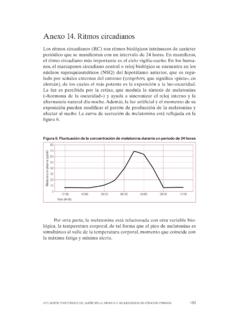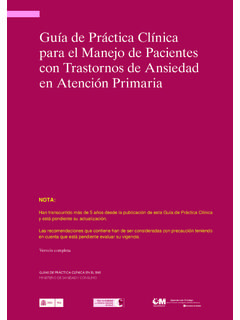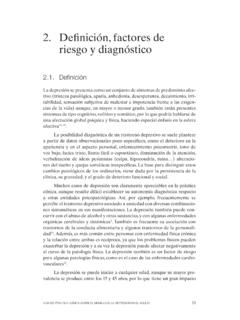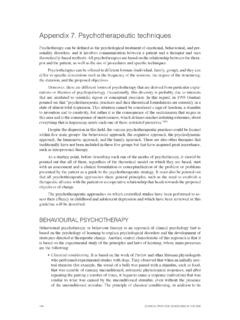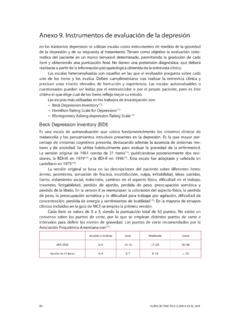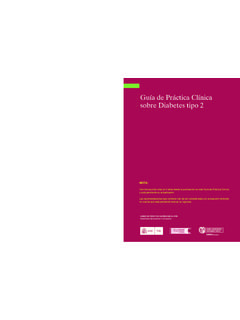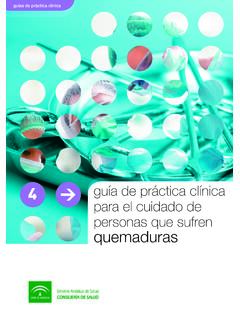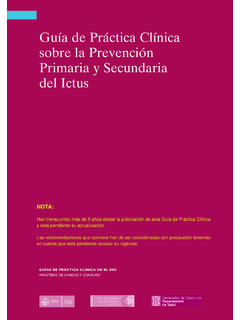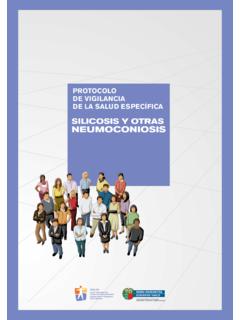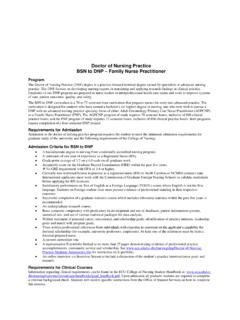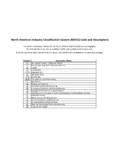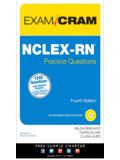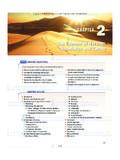Transcription of Appendix 2. NANDA diagnoses (North American …
1 86 CLINICAL PRACTICE GUIDELINE FOR THE MANAGEMENT OF PATIENTS WITH AUTISM SPECTRUM DISORDERS IN PRIMARY CAREA ppendix 2. NANDA diagnoses ( north American nursing Diagnosis Association) proposed for children with ASD and their relatives144,145 The standardised nursing care plan shown is aimed to the care of children from 0-6 years with Autism Spectrum Disorders (ASD) in the fi eld of Primary Care. The problems which are more frequent in these children and their families are presented. For its description, we have used the labels of the NANDA taxonomy, including the nursing intervention codes (NIC) and the nursing outcomes (NOC).Nurses from Primary Care and Specialised Care have participated, so as to reach a consen-sus, which ensures the continuity of the care provided and the coordination between the different care , it must be remembered that standardised care plans involve an abstraction and should always be individualised and contextualised.
2 That is, be understood as a proposal that each nurse must tailor to each child and oriented to child with ASD 00 111 Delayed growth and development: Deviations from the rules for an age group 00 112 Risk of failure to develop: Risk of suffering a 25% or more delay in one or more areas of social or self-regulatory behaviour, cognitive, language or gross or fi ne motor skillsNOCNIC0120 Child development: 1 month8274 Promoting development: child0100 Child development: 2 months5605 Education: infant stimulation0101 Child development: 4 months5566 Paternal education: family upbringing of children0102 Child Development: 6 months0103 Child development: 12 months8250 Care Development0104 Child development: 2 years4360 Behaviour Modifi cation0105 Child Development: 3 years0106 Child development: 4 years0107 Child Development: preschool0108 Child development: second childhood00 051 Impairment of verbal communication: Decrease, delay or lack of ability to re-ceive, process, transmit and use a system of symbolsNOCNIC0902 Communication4976 Improving communication: speech defi cits0903 Expressive communication5540 Enhancing the provision of learning0904 Receptive communication4720 Cognitive Stimulation5460 ContactCLINICAL PRACTICE GUIDELINES IN THE SPANISH NHS 8700 052 Impairment of Social Interaction: Ineffective or qualitatively insuffi cient or exces-sive social in games5100 Enhancing socialisation1502 Social interaction skills4362 Behaviour Modifi cation: Social skills0915 Hyperactivity Level4430 Therapy with games4352 Management of behaviour: hyperactivity / lack of attentionFamily-oriented diagnoses of a child with ASD00 126 Defi cient knowledge (specify).
3 Lack or defi ciency of cognitive information related to a specifi c topicNOCNIC1803 Knowledge: disease process7400 Health System guides1824 Knowledge: medical care5510 Health education1806 Knowledge: health resources5568 Parental education1823 Knowledge: health promotion5632 Education: young child safety1801 Knowledge: child safety5630 Education: young child nutrition1700 Beliefs about health5520 Facilitating learning1703 Beliefs about health: perception of resources6610 Hazard identifi cation00 075 Provision to improve family coping: Effective management of the adaptive tasks of the family member involved in the challenge of the patient s health, which now shows need and willingness to improve his or her own health and development and that of the patientNOCNIC2204 Relationship between the primary caregiver and the patient7140 Family support2602 Family functioning5240 Counselling2605 Family involvement in professional health care7280 Siblings support00 073 Disabling family coping.
4 Behaviour of a signifi cant person which implies the disa-bling of his or her own capabilities and those of the patient to actually leave essential tasks so that both can adapt to the health challengeNOCNIC2506 Primary caregiver s emotional health 7110 Promoting family involvement2508 Primary Caregiver s Welfare7120 Family mobilisation2208 Family Caregiver s Stressors4700 Cognitive restructuring88 CLINICAL PRACTICE GUIDELINE FOR THE MANAGEMENT OF PATIENTS WITH AUTISM SPECTRUM DISORDERS IN PRIMARY CARE2210 Possible resistance to family care5400 Enhancing self-esteem1606 Participation in decisions about health care 00 074 Family coping involved: The person who usually provides the main support in this case provides help, comfort, assistance or insuffi cient or ineffective encouragement, which may be necessary for the patient to manage and dominate those adaptive tasks related to his or her healthNOCNIC2600 Overcoming family problems5270 Emotional Support2604 Standardisation of the family7040 Primary Caregiver Support2205 Performance of primary caregiver: direct care5250 Support for decision making2206 Performance of primary caregiver: indirect care5230 Increase coping skills7100 Stimulation of family integrity7200 Foster family standardisation5520 Facilitating learning00 164 Provision to improve parental role.
5 Pattern of providing an environment for children or other dependents that is suffi cient to promote growth and development and can be parenthood1603 Behavioural Health Search5566 Paternal education: family upbringing of children1602 Conduct health promotion5568 Paternal education: child00 058 Risk of deterioration in the relationship between parents and the infant / child: Alteration of the interactive process between the parents or a signifi cant person and the infant / child that fosters the development of a reciprocal protective and training bonds6481 Environmental management: Coming together process2211 Implementation of the parenting role 6710 Fostering the bringing together 1704 Beliefs about health: perception of threat 5370 Empowerment roles 5480 Clarifi cation of values4480 Facilitating self-relianc
